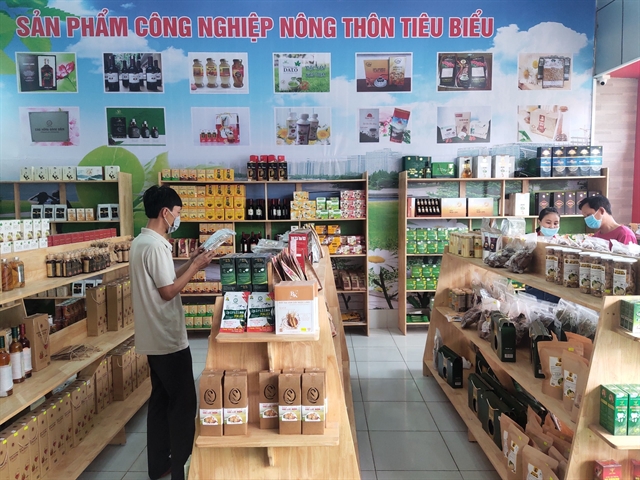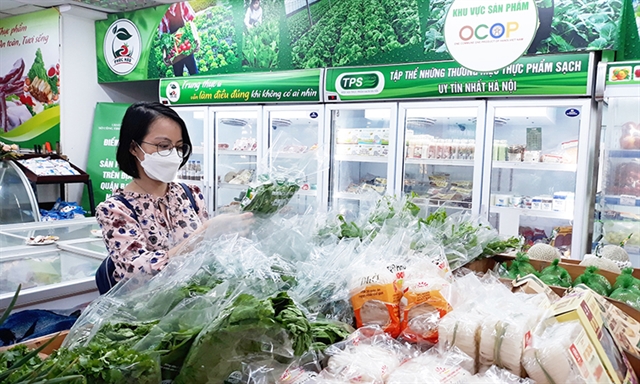 Economy
Economy

 |
| Hà Nội has opened and put into operation 105 points to introduce and promote OCOP products to serve consumers in districts, and towns. — Photo tapchibaohiemxahoi.gov.vn |
HÀ NỘI — Accessing and bringing OCOP products into the supermarket system can be difficult, especially for small-scale operations.
One of the reasons is that processed products are still few in number and small-scale production leads to limited competitiveness of products.
At a recent discussion on promoting OCOP products to consumers through the supermarket system, Hà Nội shared the results in the production and consumption of products.
In addition to traditional consumption channels, for many reasons, many have not been able to bring products into the supermarket channel.
Head of sales of the Gold Cows Milk Joint Stock Company in Ba Vì District, Phan Uyên, said that due to the characteristics of small-scale production units, barcodes have not been developed.
Meanwhile, this is a mandatory requirement for goods in supermarkets. In addition, specialty products need specialised sales staff to introduce them to customers, but it is difficult to arrange for them to be in supermarkets.
Payment for products when being brought into supermarkets was also slower than selling directly to consumers, making it difficult for small businesses to turn around capital, she said.
Đàm Văn Đua, Director of Đông Cao General Service Co-operative in Mê Linh District said that products entering the supermarket system needed to be packaged and preserved according to certain standards.
Meanwhile, due to the large vegetable output, up to hundreds of tonnes per day, the cooperative often brings products to traditional markets and collective kitchens.
Proposing solutions to overcome difficulties for OCOP entities in the process of finding output for products, bringing products closer to consumers, from the perspective of the management agency, the Hà Nội Department of Industry and Trade said that it would guide OCOP product suppliers to launch product lines suitable for designs and consumer tastes, prioritising the promotion of product connections with eco-friendly packaging.
The unit will also continue to promote support for the development of commercial infrastructure including supermarkets, convenience store chains and safe food business locations, creating fixed locations for selling and exchanging goods and OCOP products for businesses, cooperatives and production households.
As far as the Department of Agriculture and Rural Development's concerned, Hà Tiến Nghi, deputy head of the Division of Rural Development, said that in addition to fair events, festival weeks, the city has opened and put into operation 105 points to introduce and promote OCOP products to serve consumers in districts and towns.
As a product retailer, the Saigon Co.op retail system currently has more than 130 OCOP products including fruits, poultry eggs, honey, bird's nest with rock sugar and vegetable powder.
In the coming time, Saigon Co.op will continue to promote cooperatives and local suppliers to bring agricultural products into the diversified system.
To continue promoting the results of the Vietnamese People Prioritise Vietnamese Goods campaign, the Steering Committee of the campaign in Hà Nội continues to implement solutions, including solutions to bring OCOP products to consumers, especially through the supermarket system.
The Prime Minister issued Decision No 490/QĐ-TTg approving the One Commune One Product (OCOP) Programme in 2018.
This is a programme to develop the rural economy in the direction of promoting local internal resources and increasing value, raising the income of rural residents, contributing to the construction of new rural areas.
This programme was born with three goals: Developing forms of production and business organisation, shifting economic structure, improving incomes and living standards for people and industrialising and modernising agriculture and rural areas.
After nearly five years of implementing the OCOP programme, 29/30 districts and towns of the capital city of Hà Nội have evaluated and classified 2,769 products.
Of these, six products achieved five stars, 12 products achieved five-star potential, 1,485 products achieved four stars and 1,266 products achieved three stars. — VNS




